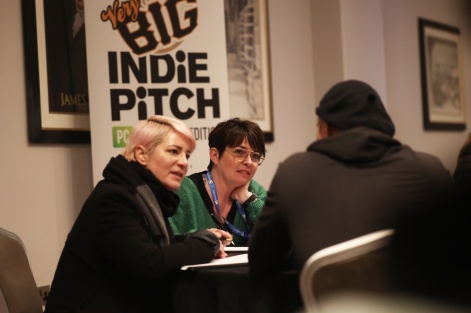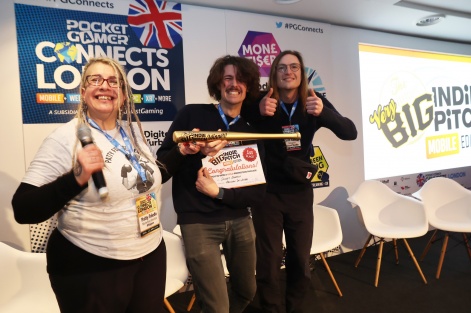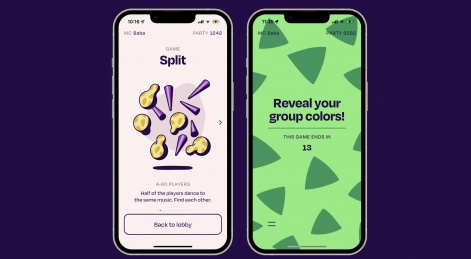The Big Indie Pitch, a regular event run by the makers of PocketGamer.biz, sees indie developers engage in a rapid-fire pitching competition for fame and those sweet promotional packages.
The event gives indies four minutes to pitch their games to a panel of press, publishers, and industry pundits, each receiving invaluable feedback before the judges pick three winners.

The indie view
The Big Indie Pitch is getting bigger and bigger as we bring it across the world. We've sat down with a number of past BIP contestants to offer their views on the event, its attendees, and the games on show.
Today, we're speaking to Adriaan de Jongh, who alongside collaborators created and pitched Secret Shuffle, at The Very Big Indie Pitch at Pocket Gamer Connects London 2023 in January 2023 and for the third time, walked away as the winner.

Sophia Aubrey Drake: Tell us a little about yourself and your indie studio - who is on the team, and what are their inspirations?
Adriaan de Jongh: I’m Adriaan de Jongh, a game designer in the Netherlands. For every game, I collaborate with other people; for Secret Shuffle, I worked primarily with 4 others: illustrator Sim Kaart, sound designer Yero Pharaoh, creative producer Sandy Seifert, and filmmaker Gilles van Leeuwen.
I don’t know what everyone’s inspirations are, but I know that what inspires me constantly changes. I will admit straight away that I’m not particularly inspired by anything to make games, but in broader terms, I’m currently fascinated by the concept of the Beginner's Mind, something I’ve come across many times in my Movement practice. In practical terms, it gives me the patience to try something over and over again and keep at it, something that I think is an essential ingredient in game development and marketing.
I don’t know what everyone’s inspirations are, but I know that what inspires me constantly changesAdriaan de Jongh
Tell us about Secret Shuffle, which you pitched at the competition.
Secret Shuffle is a music party game for 4 – 60 who are all in the same room wearing headphones. The app syncs the music between players so they can dance to it and play 1 of 10 game modes together. Watch the trailer to get a sense of what that looks like.
What do you think are the most unique and interesting aspects of Secret Shuffle that gamers may never have seen before?
I don’t think gamers have ever seen a game where all the game mechanics are in people’s dancing and in between players. There are dancing games and there are local multiplayer games, but none like Secret Shuffle where the game is entirely based on people’s creativity in dancing and the social interactions that make up the game.
I also think that is rather unique that Secret Shuffle has no points or leaderboards or even explicit “you are the winner” moments. The game focuses on playing, not on winning, and I imagine that’s something some people need to get used to.
The game focuses on playing, not on winningAdriaan de Jongh
Finally, I don’t think there are any other games that truly ask people to be creative in their dancing. All dancing games I’ve seen are about following a choreography, whereas the dancing in Secret Shuffle is a way to communicate.
Secret Shuffle is a social music game inspired by silent discos. What made you choose to make this type of game, and what do you think you bring that may not have been seen before?
The original idea for Secret Shuffle came to me when I was dancing at a party about 7 years ago. There was this person dancing next to me in such a weird way that I thought, “is this person even hearing the same music?!” And that’s when it struck me that I could make a game where people have to guess whether they are dancing to the same music.
I made a prototype and immediately found it super fun. But I also saw one major practical challenge to making this game, which was licensing the amount of music the game needed. In my search for how to make it feasible, I found prototypes and rough versions of the concept by other developers, but nobody had solved the music licensing problem properly and all of them were limited to one game mode. I did end up finding a way to license the music, fortunately.
How did you come to choose the platforms that you would develop Secret Shuffle for?
Unless you think dancing around with your laptop is practical, smartphones are the only logical option.
Looking at the studio a little more now. How hard is it to survive as an Indie developer?
I think how hard it is to survive as an indie developer depends on whether you can find a way to make a multi-year investment in making and releasing many different kinds of games. But the moment you’ve released a hit game, it all becomes so much easier. Hidden Folks was my financial breakthrough after 7 years of struggling and 5 commercial game releases, and it has generated a steady revenue stream - not only for me but also for my collaborators. This gives me the opportunity to keep experimenting and make the games I want to make, on top of something great on my track record that opens many new doors.
Ask for help and advice from industry peers, all the time: sometimes a nugget of information can make a huge difference in your careerAdriaan de Jongh
Funnily enough, what’s currently my biggest challenge is combining making games with my new family life. I love my new son, but he’s also eating up all my time.
Are there any tips and advice you would give to an independent developer out there who is just starting out?
Ask for help and advice from industry peers, all the time: sometimes a nugget of information can make a huge difference in your career. Hustle till you make it: getting funding is hard, but not impossible, especially not if you’re willing to make a few concessions just to enable you to make games at all.
How did you find your experience pitching as a part of the Big Indie Pitch? What do you feel you have gained from the experience, and what do you still hope to gain?
I find pitching really fun because I see every single pitch as an opportunity to learn something about the words and expressions and other materials I use. I see a massive overlap in pitching to a jury or to players, so in the long term, I even think it’s important for your marketing strategy. Of course, the Big Indie Pitch is no exception in that opportunity, and obviously, winning the pitch is a huge honour too, and a bit of validation, but I don’t think I’ll ever be done iteration on my pitch.

What are your hopes for this game in the future, and do you have any plans for any future projects?
We'll continue to work on Secret Shuffle for at least the rest of the year. This is the first free-to-try game I've made, the first time I'm trying to successfully run ads to reach new players, and we continue to learn so much every day. We have no big hopes for the game other than at least making back the money I put into it.
As for my plans for a future project, I'll first need to settle with my new family situation, but I may finally open my mind to a sequel of my most successful game, Hidden Folks. No promises though.
Want to show off your exciting new game? We host Big Indie Pitch events throughout the year, so be sure to keep an eye out on our events page for an event near you, or even our new Digital pitches.
All our upcoming pitches including how to enter can be found over on our upcoming events page on BigIndiePitch.com.
Get the latest news, interviews and in-depth analysis on Twitter, Facebook, and our daily newsletter.





















